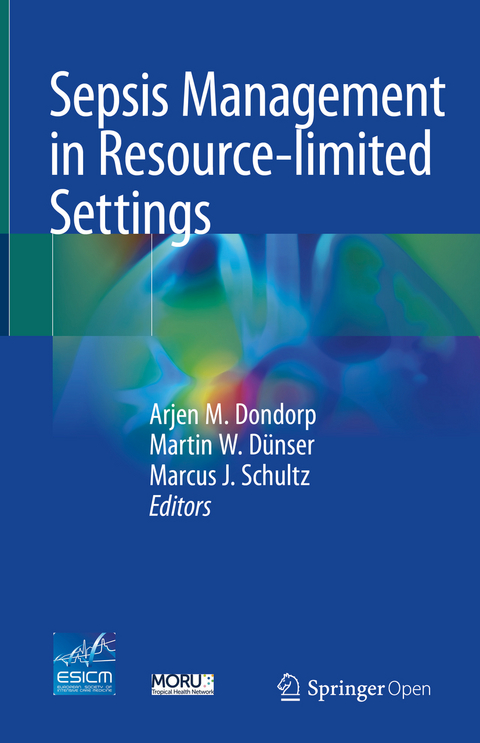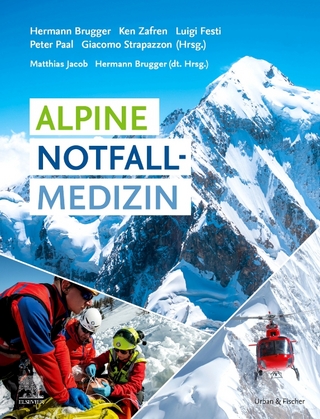
Sepsis Management in Resource-limited Settings
Springer International Publishing (Verlag)
978-3-030-03142-8 (ISBN)
This book is open access under a CC BY 4.0 license. It constitutes a unique source of knowledge and guidance for all healthcare workers who care for patients with sepsis and septic shock in resource-limited settings.
More than eighty percent of the worldwide deaths related to sepsis occur in resource-limited settings in low and middle-income countries. Current international sepsis guidelines cannot be implemented without adaptations towards these settings, mainly because of the difference in local resources and a different spectrum of infectious diseases causing sepsis. This prompted members of the Global Intensive Care working group of the European Society of Intensive Care Medicine (ESICM) and the Mahidol-Oxford Tropical Medicine Research Unit (MORU, Bangkok, Thailand) - among which the Editors - to develop with an international group of experts a comprehensive set of recommendations for the management of sepsis in resource-limited settings. Recommendations are based onboth current scientific evidence and clinical experience of clinicians working in resource-limited settings. The book includes an overview chapter outlining the current challenges and future directions of sepsis management as well as general recommendations on the structure and organization of intensive care services in resource-limited settings. Specific recommendations on the recognition and management of patients with sepsis and septic shock in these settings are grouped into seven chapters. The book provides evidence-based practical guidance for doctors in low and middle income countries treating patients with sepsis, and highlights areas for further research and discussion.
Arjen M. Dondorp is the deputy director of the Mahidol-Oxford Tropical Medicine Research Unit (MORU) in Bangkok, Thailand, and a professor of Tropical Medicine at Oxford University, U.K. and at Mahidol University, Thailand. At MORU he also heads the department of Malaria and Critical Illness. His main research interests include the pathophysiology and treatment of severe malaria, antimalarial drug resistance, and improvement of critical care in resource-poor settings. He has lead large clinical trials on severe malaria and other diseases and, in collaboration with the co-editors, he has organized ICU training programs in Asia. Arjen is a member of the Global Intensive Care working group of the European Society of Intensive Care Medicine (ESICM), and is involved in several WHO and Global Fund committees. He completed his training in infectious diseases and in intensive care medicine at the Academic Medical Centre in Amsterdam and obtained his doctorate from the University of Amsterdam, The Netherlands. Martin W. Dünser is vice-director of the Department of Anesthesiology and Intensive Care Medicine of the Kepler University Hospital in Linz/Austria. He was trained in anaesthesia, intensive care and emergency medicine and worked as an intensive care consultant in Bern/Switzerland, Salzburg/Austria and London/United Kingdom. He is a pre-hospital emergency physician for the Austrian Red Cross and worked for London's Air Ambulance. In addition to his clinical work, Martin is interested in medical work in low- and middle-income countries and has been involved in field work in Africa and Asia. He was co-founder and chair of the Global Intensive Care working group of the European Society of Intensive Care Medicine (ESICM). Martin serves as co-chair of the Sepsis in Resource-Limited Nations initiative of the Surviving Sepsis Campaign. He was deputy chair and chair of the Trauma and Emergency Medicine section and is a past member of the Research as well as the Congress Committee of the ESICM. Martin is a reviewer for numerous journals and author of over 200 scientific articles. Marcus J. Schultz is an intensivist and one of the Principal Investigators of the Academic Medical Center and professor of Intensive Care Medicine at University of Amsterdam. For 10 years, he was the chair of the 'Laboratory of Experimental Intensive Care and Anaesthesiology' (L·E·I·C·A), a university-based laboratory specialized in translational research in the filed of mechanical ventilation. He is a (founding) member of the 'PROtective VEntilation Network', a worldwide collaboration of intensivists and anaesthesiologist in ventilation research and lung protection. Prof. Schultz has performed over 60 clinical trials, published numerous articles in medical journals and various chapters in scientific books, has received several research awards, and serves as a reviewer and editor of several international journals. His main research interests are in the area of lung injury, pneumonia and mechanical ventilation. Marcus Schultz initiated several national and international projects aiming at implementation of intensive care unit strategies in daily critical care practice, both in high-income countries as well as in resource-limited ICUs in middle- and low-income countries in South-east Asia. Marcus Schultz completed his medical degree (cum laude) and residency in internal medicine at the University of Amsterdam and the Academic Medical Center, Amsterdam, The Netherlands. He obtained his doctorate at the same University.
1. Current Challenges in the Management of Sepsis in ICUs in Resource-poor Settings and Suggestions for the Future.- 2. Development of the Guidelines - Focus on Availability, Feasibility, Affordability and Safety of Interventions in Resource-limited Settings.- 3. Infrastructure and Organization of Adult Intensive Care Units in Resource-limited settings .- 4. Recognition of Sepsis in Resource-limited Settings .- 5. Core Elements of General Supportive Care for Patients with Sepsis and Septic Shock in Resource-limited Settings.- 6. Ventilatory Support of Patients with Sepsis or Septic Shock in Resource-limited Settings.- 7. Hemodynamic Assessment and Support in Sepsis and Septic Shock in Resource-limited Settings.- 8. Infection Management in Patients with Sepsis and Septic Shock in Resource-limited Settings.- 9. Management of Severe Malaria and Severe Dengue in Resource-limited Settings.- 10. Pediatric Sepsis and Septic Shock Management in Resource-limited Settings.
| Erscheinungsdatum | 06.02.2019 |
|---|---|
| Zusatzinfo | XV, 216 p. 8 illus., 6 illus. in color. |
| Verlagsort | Cham |
| Sprache | englisch |
| Maße | 155 x 235 mm |
| Gewicht | 504 g |
| Themenwelt | Medizin / Pharmazie ► Medizinische Fachgebiete ► Notfallmedizin |
| Schlagworte | Evidence-based Medicine • low-income countries • middle-income countries • open access • recommendations • Resource-limited settings |
| ISBN-10 | 3-030-03142-X / 303003142X |
| ISBN-13 | 978-3-030-03142-8 / 9783030031428 |
| Zustand | Neuware |
| Informationen gemäß Produktsicherheitsverordnung (GPSR) | |
| Haben Sie eine Frage zum Produkt? |
aus dem Bereich


